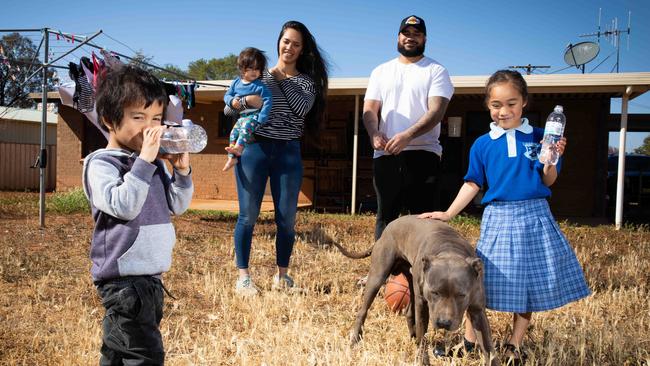Drought powers to delay ‘day zero’, when town water runs out
Sweeping emergency powers will be used to keep towns hit by severe drought from running out of water.

Sweeping emergency powers will be used to keep towns hit by severe drought from running out of water, including abandoning environmental approvals for some projects and placing residents ahead of the health of rivers.
The Australian can reveal some of the new measures allow the NSW government to temporarily stop allocating water for the environment in favour of getting it to towns.
A document obtained by The Australian lists three initial projects where the legislation will be applied, allowing the government to forgo environmental impact statements. It says this will accelerate completion of the projects by six to nine months. One is a plan to locate pumps and additional energy services to access the water at the bottom of Burrendong Dam on the Macquarie River, to provide more water to several towns, including Cobar.
Burrendong Dam is down to 4 per cent of capacity, leaving Cobar facing the prospect of running out of water next month.
Cobar Shire Council general manager Peter Vlatko said the new pumping project would push back “day zero” to May.
The Endeavour zinc and lead mine near Cobar is in danger of closing down because of lack of water security. John Fakahua works at the mine, and 100 of his colleagues have already been made redundant.
It’s been so dry for so long that Mr Fakahua’s three children — Kasalia, Aisea and Sione — don’t know how to react when it rains.
When Cobar experienced a rare drizzle recently, the children, aged 5, 3 and 1 respectively, woke up in the dark hours of the morning to the sound of faint noises dinging their roof, excited but unsure of what was happening.
The children’s morning routine as they get ready for school and preschool is dominated by drought measures.
Their mother, Riki Schaumkell, is not satisfied with Cobar’s tap water quality, and spends $30 a week buying 72 600ml bottles of water, which the family uses for drinking, cooking, and cleaning fruit.
Mr Vlatko said the measures announced by the government showed it “cares about taking action before red tape”.
“This gives us more time to wait for it to rain,” Mr Vlatko said. “It’s going to make sure we’ve got more days and more months of water.”
Another project that would be accelerated under the legislation is a new pipeline from Chaffey Dam to the existing Dungowan Dam to get water more efficiently to Tamworth in the state’s northeast, which has dams holding only 19 per cent of their capacity.
A third would be a proposal from Orange City Council to modify rules on how the Macquarie River-to-Orange pipeline operates, such that authorities could draw water in time of drought. This is banned under the current regime because pumping is allowed only in high flows.
The document obtained by The Australian says the legislation would give the government the power to suspend water-sharing plans “to give priority to town water supply over the other users including the environment where critical” and also eschew rules about how much water must get to the end of a river.
The drastic measures announced on Wednesday by Deputy Premier John Barilaro and Water Minister Melinda Pavey are contained in legislation brought before the parliament.
The legislation will self-extinguish in two years unless extended for a maximum of a further 12 months.
Mr Barilaro called on Labor and crossbenchers to pass it through the upper house, where the Coalition does not have a majority.
“We don’t have months ahead of us for some of these towns,” the Nationals leader said. “The approval process for emergency infrastructure needs to be made in a timely manner so we do not run out of water.”
It is understood some ministers believe the measures go too far, and Mr Barilaro conceded there was “robust discussion” in cabinet.
Three dam projects — the $650m raising of the Wyangala Dam in the state’s central west, the $480m new Dungowan Dam near Tamworth, and a proposed dam on the Mole River near Tenterfield in the state’s far north for which an initial $24m has been allocated, will have their assessment processes speeded up.
The projects will be declared state significant, so that environmental approval comes directly under the Minister for Planning, and can be pushed through in as little as a few months rather than a year or more. Greens water spokesperson Cate Faehrmann accused the government of trying to stop scrutiny of dam proposals.
“Emergency measures are needed to ensure towns don’t reach day zero, but fast-tracking the approval of dams that won’t be built for another four or five years is a cynical attempt to take advantage of the drought to get away with environmental vandalism,” Ms Faehrmann said.



To join the conversation, please log in. Don't have an account? Register
Join the conversation, you are commenting as Logout